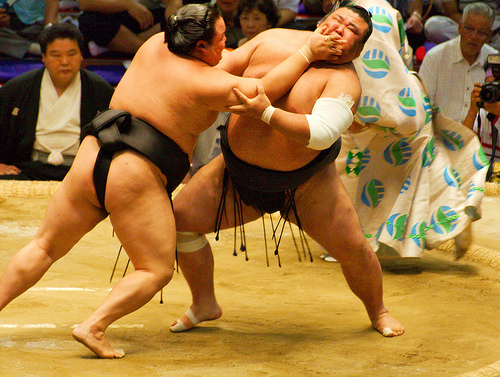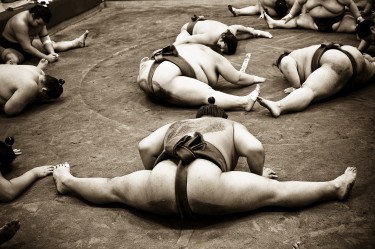Salt throwing, leg-stomping to scare the evil spirits away from the ring and power water rinsing…none of these ceremonies that traditionally inaugurate the opening of a Grand Sumo match, have been or will be broadcast live this year on the occasion of the July Nagoya Tournament.
The connection between the world of sumo and the yakuza crime syndicates [en] have been finally highlighted [en] and the scandals involving gambling and tickets sold to the crime ‘godfathers’ have aroused public ire.
So it was inevitable that the public TV NHK decided, for the first time in its history, to dedicate to the tournament only a few minutes in its evening digest after hundreds of viewers called to urge them to take such drastic measures.
While millions of soccer lovers were waiting anxiously for the last match of the World Cup, on the 11th of this month, those in Japan who wanted to follow the sumo bouts, usually broadcast live by the public TV, had to content themselves with following the first day of the tournament through a brief recap of the day.
Sumo fan MCBenZai-Kei was disappointed and complained that the NHK digest didn't do justice to the spirit of the sport.
相撲ファンとして、生中継がないのは残念です。[…]
大相撲中継を楽しみにしているお年寄りなどには気の毒な措置だと思います。
私も残念です。[…]
大相撲というのは、生放送で見てこそ魅力があるのです。幕ノ内の取り組みなどは、関取が土俵の下に入ってから仕切り立ち会いまで見てこそ大相撲の魅力があります。
勝敗だけわかればいいという性質の競技ではないんですよね。
I think it is a real shame for those elderly people who were looking forward to watching the tournament live to be so deprived. Personally, I also think it's a pity.[…]
Sumo is a sport that is fascinating if watched live. The top division bouts, when the ranking wrestlers enter the ring and start fighting, is all part of sumo's appeal. It's not like one of those sport, where you merely need to know who loses or wins.
Drug abuse [en] and violent behaviour [en] by sumo wrestlers have made it onto the front pages of tabloids and newspapers in past years, but this is the first time that the National Police have decided to crack down on those shadowy ties.
The last straw was the discovery that some wrestlers were involved in betting on baseball matches [en] which is illegal in Japan. But already last year, police officers reacted swiftly when they noticed some members of a recognized crime syndicate being filmed while sitting in the front row at a sumo match.
According to their investigations, it was not the first time yakuza bosses had been given special tickets to watch a bout and the aim of them sitting in front of the cameras was to be seen by gang members in jail where the prisoners are allowed to watch sumo on TV.
Former Yomiuri Shimbun reporter Jake Adelstein, who specializes in crime reporting and is considered an expert of yakuza issues, explained the details and the background of the matter in an exhaustive post, where he also revealed some previously hidden facts.
One part of the sumo-yakuza-gambling scandal that may never come to light is that, not only were sumo wrestlers were participating in the gambling, so were some executives from the Japanese companies sponsoring the sumo tournaments. For those reasons, the investigation is likely to be cut off at a predetermined point before it becomes an international embarrassment. Established connections between gambling, yakuza, sumo and major Japanese corporations wouldn’t reflect well on the business image of Japan. There is already a proposal to “pin the crime” on low-level yakuza boss who died of natural causes last year, designating him the “puppet master” who ran the show. Dead men make the perfect fall guys and don’t say things they shouldn’t. The Tokyo Metropolitan Police Department is doing their job and doing it in the way they’ve probably always wanted to do it. Except now they are acting with the approval of the National Police Agency from the top down.
According to the list [ja] compiled by k_myoren, the first scandals involving wrestlers date back to the ‘60s and many in Japan seem convinced that the ties between the underworld and the sumo world are deeply intertwined [en] and will prove difficult to eradicate.
Tetsuwan Taro said that after such dark happenings, there shouldn't be any obligation to continue to financially support the Sumo Association, which is a public-interest corporation, with public money.
ヤクザと暴力団は違うのかもしれないけど、暴力団がヤクザの仕事の継承として相撲と深く係わってきた長~~~い歴史があるはずで、何百年も続いてきた関係を切れと言われても、簡単にはいかないでしょ。
恩とか義理とかプレッシャーとか脅しとかお金とか・・・・ドロドロドロドロ
So even if someone may say that such criminal connections which have existed for loooong time can eventually be cut, it will not be an easy task!
Obligation, duty, pressure, threats and money… It's a murky mixture!!
The tournament will go on until July 25 but the only choice left to dedicated sumo fans is to visit the venue in Nagoya (central Japan) to watch it.
Sumo journalist Oozumou has been keeping a journal with a commentary on the bouts and the match results.
According to this sumo expert, compared to the previous year, there was a 10% decrease in the number of viewers and many sponsors decided to withdraw their support causing the amount of prize money to be reduced [en] to one quarter.
Sumo has been long considered as a sacred sport which has its roots in Shinto ritual and has a 2000 year history [en]. But, according to some [ja], the recent scandals have contributed to destroying this image and reducing it to a mere money-related entertainment like any other wrestling bout which deals more with entertainment than any religious aspect.
Nonetheless young athletes, who put all their efforts and dreams into treading the sacred ring as champions some day, ask the fans to hang in there and keep loving the sport!
Former sumo wrestler and writer Yoshinori Tashiro says.
数年前から、何度も何度もいろんな事件が表面化し世間から見たら、もう相撲は見たくない、相撲なんて無くなれと思われていると思います。
ただ、中にはというか大半の力士たちは上の写真の様にまじめに毎日、がむしゃらに稽古しています。
一般の方で、相撲の稽古を実際に体験したことのある人は少ないと思いますが、本当にきついんです。本気で当たってきて押してくる相手を押し返し、何度も何度も土俵にたたきつけられて。
でも強くなるために、出世するために辛抱して、稽古してるのです。
ただ今回の事件は、一部の力士の責任だけではなく相撲界全体で真剣に考えなくてはいけない事態になっています。[…]
再び、国民に愛され、慕われ、応援される大相撲が復活する日を、願っております。
どうぞ今後とも大相撲を宜しくお願い致します。
However, among the sumo wrestlers there is a big majority who, as you can see from these pictures, work hard and practice exercise seriously every day.
I am sure that only few people have really experienced a sumo's exercise regime but let me say that it's very hard. It consists in pushing back the opponent who comes pushing against you with all his strength, and being knocked down a number of times.
We bear all this and practice if we want to become strong and rank up.
However, now that such incidents have come to light, it's not only some wrestlers but the whole association which has to reflect seriously on what is happening.[….]
I pray and wish that a day comes when the sumo that people love, worship and support, will revive.
So please, now and in the future, keep supporting Grand Sumo.


![Ready for Yokozuna by Sprengben [why not get a friend]](https://globalvoicesonline.org/wp-content/uploads/2010/07/Ready-for-Yokozuna-by-Sprengben-why-not-get-a-friend.jpeg)







2 comments